15. 07. 2014
Cavtat, July 14, 2014 – Traditionally, the production of food and beverage used to be a strong industry, and the countries in the region have had huge potentials in agricultural production and food industry, stressed Ljerka Puljić, Agrokor’s Senior Executive Vice President, following the roundtable discussion on food and beverages at the Summit100. “A fragmented sector is uncompetitive and weak. That is why there is a need for the strengthening of both vertical and horizontal connections that will enable expansion into third markets, while the role of politics in improving the present situation could be to possibly reduce the trade barriers,“ explained Ljerka Puljić.

Tomaž Berločnik of Petrol told the political leaders that no country in the region could independently guarantee a safe energy supply, adding that that made the sector in question particularly vulnerable. “One of the biggest problems has been the lack of investments in energy facilities over the past 20-30 years. Moreover, there is also the impossibility of following the EU directives related to energy efficiency and share of renewable energy sources in the total energy consumption,“ stated Berločnik. The participants of the energy roundtable proposed that already in September the countries’ energy ministers should meet and define a workshop at which they would, together with the businessmen in the region, discuss mutual interests and encourage work on a joint energy-related strategy for the SEE.
All the participants of the Summit100 have the same task, to ensure a decent, good-quality life for all the citizens in the region, said the Croatian President Ivo Josipović. “The fact is that we have compatible resources that complement each other. However, there are certain politics that view the economic cooperation in the region as something bad, something that harms the economy. Businessmen should not support individual politicians or political parties but policies promoting cooperation,“ Josipović believes.
President Tomislav Nikolić welcomed Summit100, saying that Serbia would definitely encourage cooperation in the region as “we were aware we could not do things on our own“. “Every single one of our respective countries can be the leader in something and lead the way towards the third markets, thus opening the door for the entire region. We can do that through agriculture as it is our mutual export strength,“ Nikolić stressed.
All those making progress in such business circumstances should be congratulated, said Bakir Izetbegović, Chairman of the Presidency of Bosnia and Herzegovina. “Even though economic indicators say we do not have much, I believe that as a region we are among the richer ones when we take into consideration all our resources, farmland, forests and cultural riches. However, capital requires security, political stability, infrastructure and quick administration, which the political leaders are responsible for,“ Izetbegović said.
Jako Andabak, president of the Management Board of the Sunce Concern, said the tourism sector was where the need for improvement of the offer was the greatest, as today’s global tourism requires more than just the sea and the sun. “Tourism needs the politicians’ support in securing a more flexible visa regime and a more straightforward crossing of the borders within the region,“ Andabak stressed.
Ivan Pavlović, President of the Management Board of the Port of Ploče, highlighted the huge problem with transport infrastructure, particularly the railways. “Seeing as there are a large number of railway operators in a small region, the costs of transport are getting increasingly high, thus impacting the competitiveness of the goods from our countries,“ Pavlović warned.
Montenegro’s President Filip Vujanović said Summit100 was a worthy initiative, commending the decision to encourage cooperation between the region’s business leaders with the goal of joint action in the region and the third markets, while his Albanian counterpart Bujar Nishani said it was an event providing us with an opportunity to share ideas and realities of our respective countries. “For decades Albania used to be the most isolated and poorest country but since the nineties things have started to drastically change for the better. Albania boasts considerable possibilities and opportunities in different sectors, particularly energy, mining, tourism and agriculture,“ Nishani concluded.
Borut Pahor stressed that this was the first time the region’s leaders had met like this, adding that it had great significance for the entire region. “This is a step forward towards creating a region of peace and prosperity. We need to support the ideas that will result in organizing thematic meetings between the region’s ministers and businessmen, as they will send a positive message and attract big investors from Europe and the world,“ Pahor stated.
Filip Filipec of Tehnika said the competition in the construction sector depended on the quality of infrastructure. “We need to act together in order to increase the competitiveness of the companies in the region. Moreover, we need a better-quality flow of both labor force and experts,“ Filipec explained.
The President of the Management Board of Alkaloid Zhivko Mukaetov said the pharmaceutical industry had the tradition and the core in this region, adding that the regulations in the industry needed to be improved in order for the cooperation to improve.
Ivica Mudrinić said development and investments came with the creation of conditions, adding that one of the chief problems was the state administration, which was still an impediment rather than a service.
According to Kosovo President Atifete Jahjaga, the countries in the region have the same economic problems, namely, unemployment, trade deficit and GDP drop, despite ethnical and regional differences. At the same time, she is confident that together we can overcome all those problems together. Finally, Macedonia’s Gjorge Ivanov said the region had physical, mental and administrative barriers that we could overcome by connecting with each other through transport, investments and education. “Our entrepreneurs are moving ahead as they have cars with large windscreens and a small rear view mirror, while we politicians often have both large windscreens and a large rear view mirror,“ Ivanov concluded.
